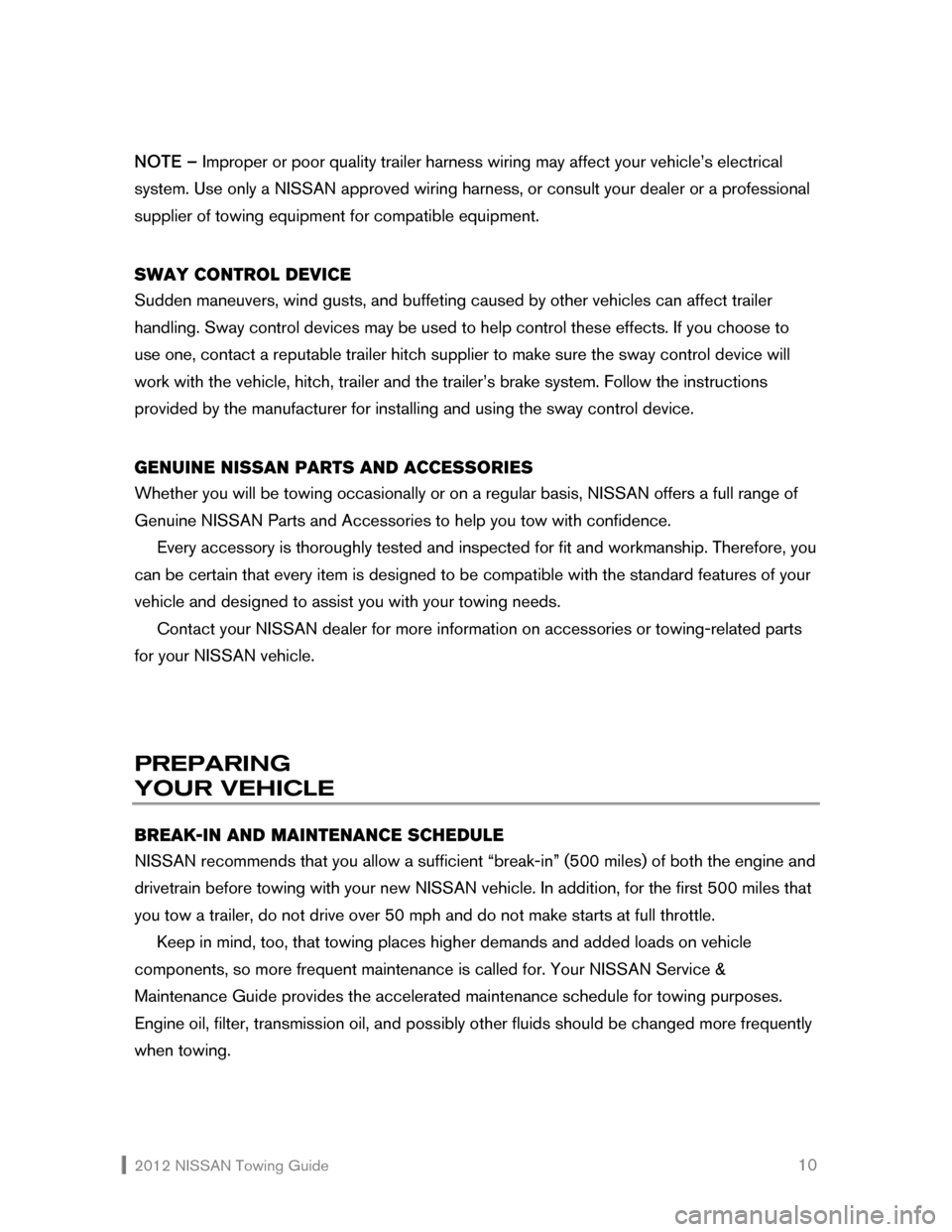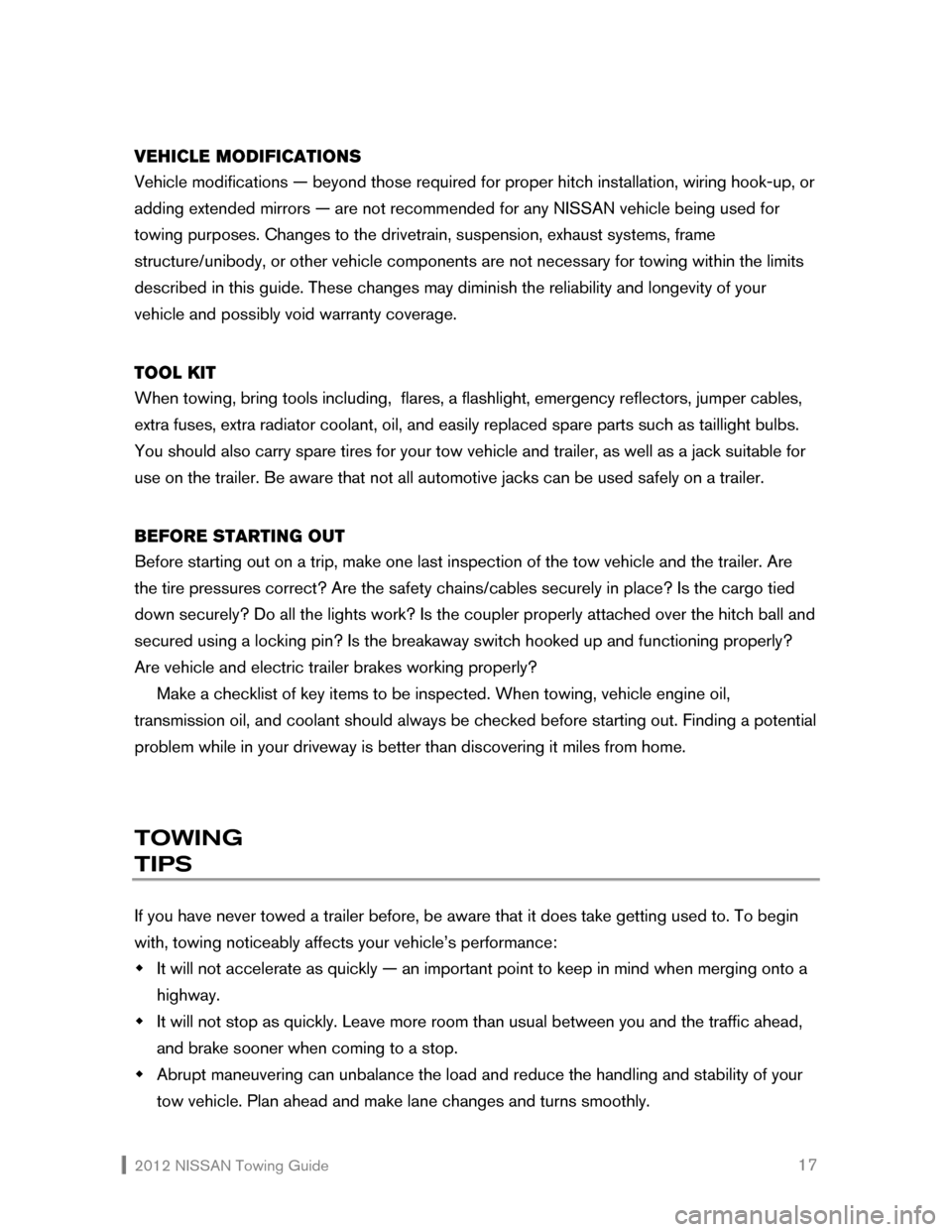engine oil NISSAN ARMADA 2012 1.G Towing Guide
[x] Cancel search | Manufacturer: NISSAN, Model Year: 2012, Model line: ARMADA, Model: NISSAN ARMADA 2012 1.GPages: 27, PDF Size: 2.93 MB
Page 11 of 27

2012 NISSAN Towing Guide 10 NOTE – Improper or poor quality trailer harness wiring may affect your vehicle’s electrical
system. Use only a NISSAN approved wiring harness, or consult your dealer or a professional
supplier of towing equipment for compatible equipment.
SWAY CONTROL DEVICE
Sudden maneuvers, wind gusts, and buffeting caused by other vehicles can affect trailer
handling. Sway control devices may be used to help control these effects. If you choose to
use one, contact a reputable trailer hitch supplier to make sure the sway control device will
work with the vehicle, hitch, trailer and the trailer’s brake system. Follow the instructions
provided by the manufacturer for installing and using the sway control device.
GENUINE NISSAN PARTS AND ACCESSORIES
Whether you will be towing occasionally or on a regular basis, NISSAN offers a full range of
Genuine NISSAN Parts and Accessories to help you tow with confidence.
Every accessory is thoroughly tested and inspected for fit and workmanship. Therefore, you
can be certain that every item is designed to be compatible with the standard features of your
vehicle and designed to assist you with your towing needs.
Contact your NISSAN dealer for more information on accessories or towing-related parts
for your NISSAN vehicle.
PREPARING
YOUR VEHICLE
BREAK-IN AND MAINTENANCE SCHEDULE
NISSAN recommends that you allow a sufficient “break-in” (500 miles) of both the engine and
drivetrain before towing with your new NISSAN vehicle. In addition, for the first 500 miles that
you tow a trailer, do not drive over 50 mph and do not make starts at full throttle.
Keep in mind, too, that towing places higher demands and added loads on vehicle
components, so more frequent maintenance is called for. Your NISSAN Service &
Maintenance Guide provides the accelerated maintenance schedule for towing purposes.
Engine oil, filter, transmission oil, and possibly other fluids should be changed more frequently
when towing.
Page 18 of 27

2012 NISSAN Towing Guide 17 VEHICLE MODIFICATIONS
Vehicle modifications — beyond those required for proper hitch installation, wiring hook-up, or
adding extended mirrors — are not recommended for any NISSAN vehicle being used for
towing purposes. Changes to the drivetrain, suspension, exhaust systems, frame
structure/unibody, or other vehicle components are not necessary for towing within the limits
described in this guide. These changes may diminish the reliability and longevity of your
vehicle and possibly void warranty coverage.
TOOL KIT
When towing, bring tools including, flares, a flashlight, emergency reflectors, jumper cables,
extra fuses, extra radiator coolant, oil, and easily replaced spare parts such as taillight bulbs.
You should also carry spare tires for your tow vehicle and trailer, as well as a jack suitable for
use on the trailer. Be aware that not all automotive jacks can be used safely on a trailer.
BEFORE STARTING OUT
Before starting out on a trip, make one last inspection of the tow vehicle and the trailer. Are
the tire pressures correct? Are the safety chains/cables securely in place? Is the cargo tied
down securely? Do all the lights work? Is the coupler properly attached over the hitch ball and
secured using a locking pin? Is the breakaway switch hooked up and functioning properly?
Are vehicle and electric trailer brakes working properly?
Make a checklist of key items to be inspected. When towing, vehicle engine oil,
transmission oil, and coolant should always be checked before starting out. Finding a potential
problem while in your driveway is better than discovering it miles from home.
TOWING
TIPS
If you have never towed a trailer before, be aware that it does take getting used to. To begin
with, towing noticeably affects your vehicle’s performance:
�Š It will not accelerate as quickly — an important point to keep in mind when merging onto a
highway.
�Š It will not stop as quickly. Leave more room than usual between you and the traffic ahead,
and brake sooner when coming to a stop.
�Š Abrupt maneuvering can unbalance the load and reduce the handling and stability of your
tow vehicle. Plan ahead and make lane changes and turns smoothly.